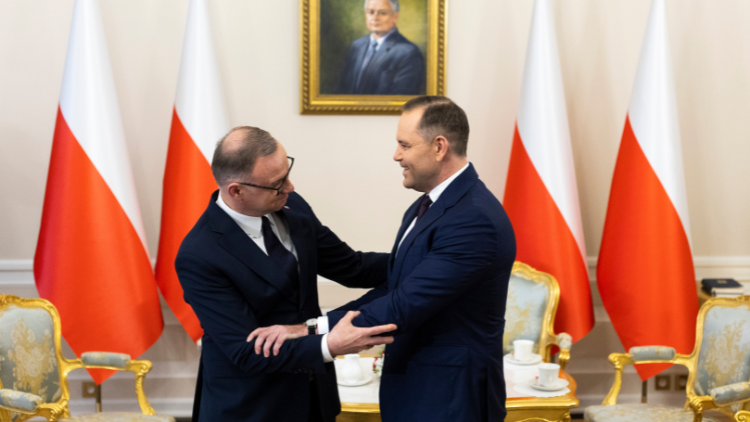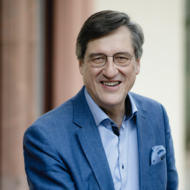Elections in Poland
Don’t Despair!

The President of the Republic of Poland Andrzej Duda (L) at a meeting with President-elect Karol Nawrocki after the Polish presidential election at the Presidential Palace in Warsaw.
© picture alliance / NurPhoto | Andrzej IwanczukIt’s heartbreaking. In Poland, Karol Nawrocki has won the presidential election—albeit by a razor-thin margin of 50.9 to 49.1 percent. But a narrow victory is still a victory. Once again, a right-wing populist has emerged victorious in a major election. For Poland and the European Union, this brings new and serious challenges. Above all, the ongoing reversal of the PiS government’s rule-of-law–undermining measures, carried out from 2015 to 2023, is now in question. The centrist-liberal government of Donald Tusk, which took over in late 2023, lacks the parliamentary supermajority needed to override presidential vetoes.
So Poland finds itself in an extremely difficult situation—one that bears a striking resemblance to the political deadlock in the United States. Nawrocki is often dubbed the “Polish Donald Trump,” not only because of his populist rhetoric, but also due to murky aspects of his past—though those date back nearly two decades.
What, then, should centrist liberals around the world do in the face of rising autocratic populism? My answer is clear: keep fighting passionately—for freedom, democracy, and the rule of law. Even if it’s becoming ever more obvious that this global struggle will take far longer than most of us assumed back in the heady optimism of the 1990s. We need endurance. Societal change toward liberal values is slow, complex, and often painful—with frequent setbacks.
It may be worth offering three points of advice to liberal-minded allies around the world:
First, don’t lose heart over every election loss. Let’s remember: just a few weeks ago in 2025, Romania elected a liberal, pro-European president, while the pro-Russian, autocratic-leaning candidate lost. In Canada, Liberal Mark Carney won the recent parliamentary election—even though he had been trailing just weeks earlier. In a world where countries like Poland and the U.S. are split almost evenly into two opposing camps, it’s often small, unpredictable campaign dynamics that determine victory or defeat. Globally, it remains a close race.
Second, don’t freeze into theatrical postures in the so-called cultural “war of values.” The societal shift toward more individual responsibility and liberal modernization faces deep resistance, especially in more rural and conservative populations worldwide. Responding with dogmatism or moral superiority does no good—and certainly not with the kind of “woke absolutism” we’ve seen in the Anglo-American world, and increasingly in parts of Europe too, which vilifies anyone holding on to traditional values as hopelessly backward. Cultural change takes time. It cannot and should not be forced.
Third, make sure to deliver tangible results—especially wherever centrist liberals hold governing responsibility. And those results must benefit not just a small, urban progressive elite, but the broader population. A particularly relevant example is Canada, where former liberal Prime Minister Justin Trudeau faced heavy criticism for neglecting the concerns of the societal mainstream in favor of a “woke” agenda. His successor Mark Carney—widely regarded as a pragmatic, no-nonsense economist—now has the opportunity, and the duty, to correct that course.
In conclusion: The chances to push back against right-wing populism are there. But to seize them, we need to replace the arrogance that has often characterized the centrist-liberal movement since its sweeping victories in the early 1990s—after the fall of the Iron Curtain and the collapse of Soviet communism—with a greater respect for the stubbornness of political reality. A generation later, it’s time to stop dreaming in the glow of past triumphs and instead roll up our sleeves for the hard, patient work that real progress requires.
